Dogs And Kids - Full Guide
23.10.2020.
Having a full house can be a beautiful thing - especially if your family consists not only of human members but of dog members as well. Having a home with dogs and kids in it is sure to be a happy and lively home full of action. Not only will your kids have a great playing or cuddling partner, but you can also have an excellent watchdog or even an alert guardian that will always have your back.
Our family dogs are usually great, and they are responsible for millions of situations that fill us with laughter and the feeling of pure love. They are also a huge responsibility, and not everyone is suited to be a dog owner. Having the right dog breed at home where you have kids is not only important; it is necessary to avoid potential problems and unwanted situations.
We are aware that many individuals love having dogs around, and picking a dog when you are single is a lot easier than picking the right breed when you have a whole family to think about. Each family member has a specific character, energy level, hobbies, and preferences, so it can be tricky to decide on a breed that will fit everyone. Picking the right dog breed is vital when you have kids.
We will try to make things easier for you, and you can use this as a guide for making the right choice for you and your family. We will answer some basic questions and make you think about what would be an excellent fit for you and your kids.
First, we bring you the top 5 family dog breeds based on the answers over 15.000 American families gave.
- Golden Retriever
- Beagle
- Labrador Retriever
- Newfoundland
- French Bulldog
Keep in mind that this is the choice that might not be right for your specific situation. These family dog breeds have wonderful traits that usually make them great with kids.
Adopting a family dog
When a family is getting a dog, a lot of families are thinking about adopting. It is a noble thing to do, and you will be saving the lives of the dog you adopt and the next dog that can come to the animal shelter. However, you can never be entirely sure what temperament these dogs will have.
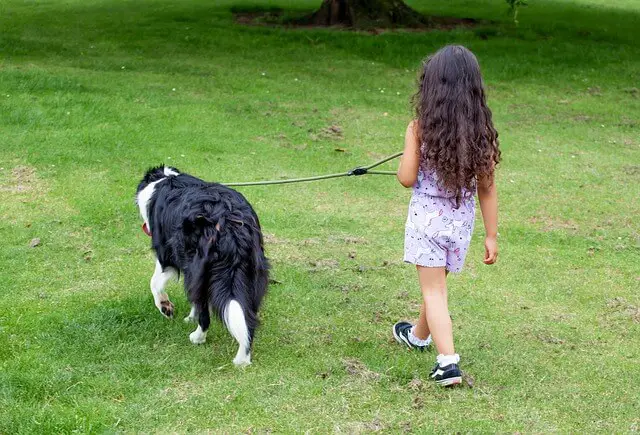
When picking the best possible dog for kids, can you risk with a dog and not be sure about their temperament? If you are in that situation, our advice would be to get a well-bred pureblooded dog. Pureblooded dog breeds have been perfected and selectively bred for centuries so that breeders could eradicate inherited diseases and they made sure a breed would have a constant and predictable character.
If you decide on adoption, that will always remain a mystery, and you can never be entirely sure about the dog's true temperament. You might end up with the most loving, caring, and gentle dog there is, or you might end up with a nervous dog that was abused and doesn't tolerate everyone quite well. A split of a second is enough for a disaster to happen.
Adoption tricks
If you decide to go with adoption, keep an eye on descriptions of dogs that interest you. Phrases like "Chooses its company," "Gets along better with females," or "Prefers to stay alone in its box" are often misleading, and the true meaning behind them can be dreadful.
These types of descriptions usually mean that a dog doesn't get along with dogs of the same sex or can't stand to be around other dogs, humans, or humans of a specific sex. Don't make a hasty decision and get to know your future dog as best as you can before you decide to get him home and introduce it to your children.
The financial part of owning a dog if you have kids
Most of us that love dogs want to have one at home, and we are not interested in thinking about the financial aspects of owning a dog and having kids. Financial aspects are a massive part of being a dog owner, and the reality of it can hit you quite fast, even if you weren't thinking about it earlier.
Think about expenses for your kids and how they change over time. When your children are babies, you will probably need to buy a stroller, a car seat, binkies, wet wipes, and endless quantities of diapers. As your kids get older, you'll buy toys, more clothes (that they grow out of in what seems minutes), bikes, school supplies, tuitions, and much, much more. That is not a small amount of money, and if you add up the costs of owning a dog - it can be a bit much.

Think about how much large, medium, or small dogs can eat (Check out these 60 cool small dog breeds here). They need collars, leashes, crates, soft beds, and bowls. These are just things you will need to buy to ensure your dog has a "normal" life. Include the costs of vet visits, unexpected vet bills, food, and insurance.
Before you decide to go for any specific family dog breed, make sure you have the budget that can cover all these dog expenses. We are well aware that this is not a small step to take, so make sure that you fully understand the cost of owning a dog. You don't want to end up having to give up your dog because you can't afford to keep it.
How to choose the right dog for kids
That is the most important decision you will need to make if you are getting a dog and you have kids. You will also need to make the right one because the alternative can result in injuries or worse. Keep in mind that kids are usually very enthusiastic about getting a dog, and they can easily make promises they won't keep. "Mom, I will take the dog for walks every day," "Mom, of course, I will pick after our dog," "Dad, please, I will do everything" - those are just some of the things your kids might say to you to get you on their side.
After the initial enthusiasm goes down, and they have to pick the 50th poop after the dog, they might not seem so happy about it anymore. As an adult, you will most likely be the one to take care of the family dog and make sure you are up for it. Think about your schedule, your working hours, how active you are, etc. The most important thing is to be honest with yourself. Having dogs and kids under the same roof can be a lot of fun, but it is also a huge responsibility.
But if you make the right decision, your kids will get one of the best gifts anyone can get. You can pick a breed that is awesome with kids. Your dog can be gentle, endlessly patient, and full of love for your kids. Some dog breeds are naturally protective of kids. Breeds like the Newfoundland even have a nickname "nanny dog" and are known for being remarkably gentle, even though they are giants.
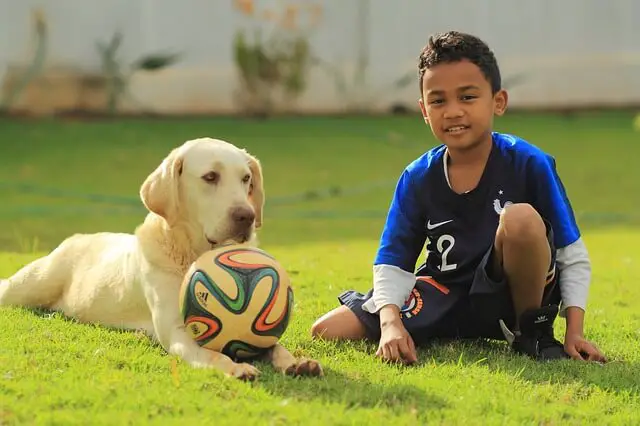
There are some things you will need to think about before you decide on any specific dog breed. Three most important things to think about are; temperament, size, and energy levels.
Temperament
Having a dog with a calm and biddable temperament will most likely be the way to go here. Dog breeds like Golden or Labrador Retrievers have such temperament. They are easily trainable, fairly intelligent, and not prone to "snappy" reactions resulting in bites or other injuries. Temperament is a big part and arguably the most important thing to think about when getting a dog for kids.
Size
Size is the second most crucial thing but it doesn't determine whether a dog is good with kids or not. Size is a huge indicator of what costs will be like, and if you live in a smaller apartment, a large dog breed might not be the best option. Large dogs are usually calmer but can easily unintentionally knock a kid over, and that is not what you would want from your dog.
Energy levels
It would help if you thought about your future dog's energy levels and your family's energy level. Are you active? Do you go for hikes? Do you jog? Do you prefer being at home relaxing? Those are all important things to know when deciding what dog breed to get for your kids. If you are not the most active family, then getting a high energy breed like a German Shorthaired Pointer or a Belgian Shepherd is not the best idea. Make sure your family's energy level is compatible with the energy level of your new dog.
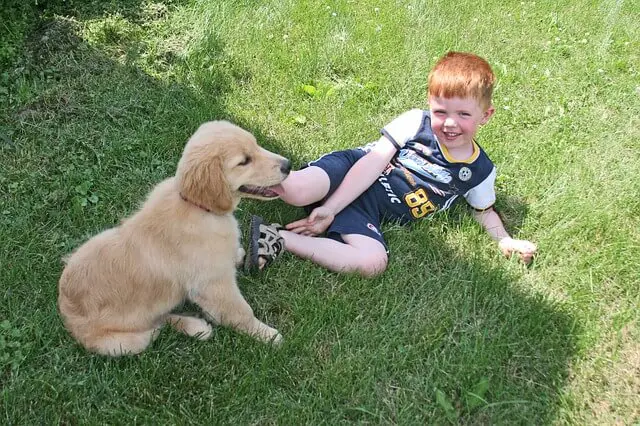
Benefits of owning a dog
Owning a dog can not only do wonders for your mental health but your physical health as well. Owning a dog reduces anxiety and depression, helps boost your cardiovascular health (because dog owners get more physical activity), and can significantly influence your social life. People with dogs usually have a more active social life, especially if you visit dog parks often and socialize with other dog owners.
One of the most incredible things dogs bring to their families is their unconditional love. Dogs will show you affection regardless of your social status, wealth, race, gender, or religion. They only care about how well you treat them and how much love you have for them.
Benefits kids with dogs have
Growing up with a dog can be one of the best things in life. Kids can learn valuable life lessons from owning a dog, and they will probably have a great playing and cuddling partner for many years to come. Here are the top benefits kids who live in a household with dogs have.
Responsibility - Dogs can teach kids responsibility. When their initial enthusiasm blows over, they will still have to take care of their dog. They will need to take them for a walk, clean after them, feed them, bathe them, and groom them. Of course, as your kid gets older, it can get more appropriate responsibilities for their age.
Health benefits - Kids that have dogs have about 11 minutes a day more physical activities than those that don't. It might not seem so much, but that makes for about 66 hours a year. Owning a family dog does miracles for your kid's health and even helps them prevent developing allergies.
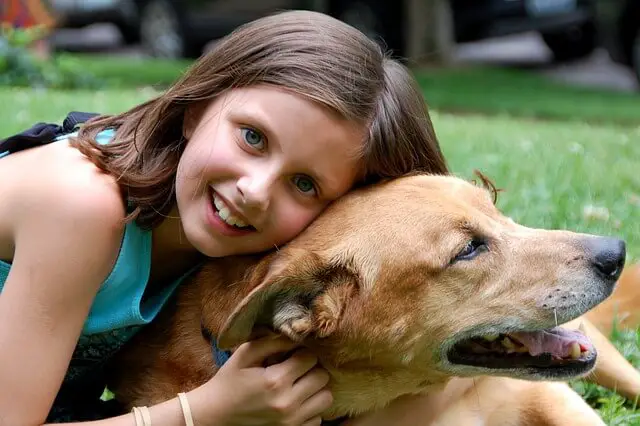
Mental health benefits - Owning a dog teaches kids things like empathy, compassion, support, helps them deal with stress, depression, anxiety, and kids feel healthier and happier. In the end, isn't that what we all want for our kids?
Disadvantages of owning a dog
Owning a dog and having kids is a huge responsibility. All of us tend to think about positive sides when we decide to get a dog, and we rarely focus on negatives or disadvantages. The real situation is - there are some.
Not only can dogs be costly to buy, but they can also have significant expenses. Make sure you have enough in your family budget for a dog.
The second big thing is that you will lose most of your spontaneity. You will not be able just to take your kids and go for a vacation or visit your family out of town. Having both dogs and kids requires a lot of planning and surfing the internet for pet-friendly places.
Dogs will require a significant portion of your time. If you want to have a well-behaved family dog, you will have to work with them. You need to train and socialize them from the moment they get to your family home. You cannot ignore your dog and hope they will not develop destructive behavior.
You need to walk them every day. Think about it - snow, rain, cold, hot, early morning, late nights. Unfortunately, dogs need to go out, and taking care of a dog and kids at the same time can quickly become overwhelming for a lot of us. Think very thoroughly before you make a decision and get a dog for your kids.
How can you be sure your kids will get along with your dog?
That is a tricky thing. Kids can react unpredictably towards a new dog, so it is essential to decide at what point in their life should you get your kids a dog. There are several possibilities, and each one of these situations should be approached with care.
Baby - Introducing a new baby to the dog can be a nerve-wracking thing to do. Your dog was your first "baby" and might feel jealous. It is a good idea for you to bring a few of the newborn baby's clothing items from the hospital and get your dog acquainted with the new baby smell. You can also start playing baby noises (crying, playful noises, etc.) before the baby is born, so your dog gets used to the strange new noises.
Toddler - If you are bringing a two-year-old home for the first time, make sure your dog is well-fed, went for a walk, and is in the most submissive state as possible. Kids can get easily scared of dogs, so make sure you take your time. Allow your dog to sniff your child and, over time, allow your dog to come closer and closer.
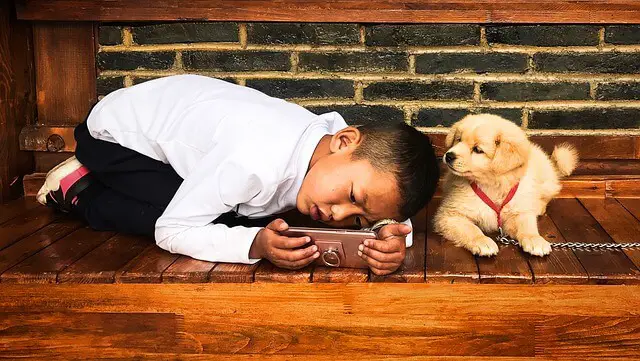
If you bring a dog to a house that already has a baby, these steps should be repeated. If you have an older kid who can understand you, explain that it needs to respect the dog and not bother it if it doesn't want to be bothered.
The most important thing is to ALWAYS supervise all dog-kid interaction. Most injuries and accidents happen in unsupervised situations.
The best thing you can do to make sure your dog and your children get along is to introduce them properly. It can be a bit tricky initially, but kids and dogs can be quick learners, and they can easily understand each other if they have been properly introduced.
You will have to take the role of the leader and teach your dog that it needs to obey your orders at all times. If you have a dog that is not listening to you, consult with a professional dog behaviorist or trainer. They can easily let you know some tips and tricks on how to train your dog. If your dog respects you, it will also learn to respect your new baby as the newest addition to the "pack," and, eventually, as the dog's new leader.
What to do if your dog and kids do not get along?
That is a realistic situation, and some families have dogs that can't accept new family members, even if they are just kids. We believe that all dogs can be taught to obey kids and respect them, but as parents, that is a risk most of us are not willing to take. If you tried all techniques and consulted a trainer, but your dog still shows signs of unwanted behavior, it might be the time to think about other options.
Giving up your dog is something none of us want to go through, and if something like this does happen, it would be wise to have a plan. Think about family members, friends, colleagues who might be looking for a dog. It is always better to give your dog to someone you know. If you have an active dog you need to rehome; you don't want to give it to a family member that is not living an active lifestyle.
There is always the possibility of giving your dog to your local shelter. That should always be your last option, but check the shelter out first if you decide to do that. See how well they are taking care of dogs and what the living space is like. Talk to the people working there and keep an eye out for any red flags. Check their adoption statistics and pick a shelter with a better possibility of getting your dog to a great new home.
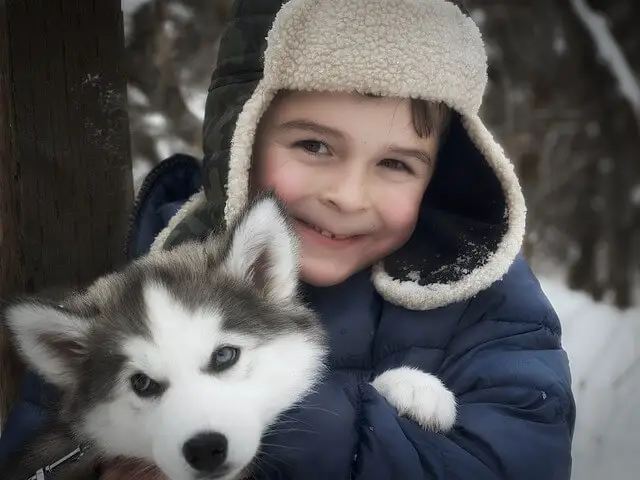
Dog bites and kids
That is the situation every parent dreads of. Even the thought of your dog harming your baby can get your palms sweating. Most of us can't even imagine something like this can happen, but there are some things you should know when it comes to dog bites and children.
Bites can happen for several reasons, and most of the dog bites happen because parents weren't properly monitoring the interaction between dogs and kids. If you are an experienced dog owner, you can easily spot warning signs and prevent something like that from happening in the first place.
If you have older kids, make sure they understand how to interact and safely play with the dog. Again, all interactions between dogs and kids should always be supervised, no matter what the breed in question is.
The most common reasons a dog can bite, according to the ASPCA, are territorial behavior, fear, and anxiety.
Dog bites statistics
All dog breeds can indeed bite kids, and people generally think that there is no rule. However, statistics and data collected by various agencies show that there are some common things we can connect. For example, most dog bites occur to boys aged 5 - 9. The reason for that is their high energy levels, playful behavior dogs can interpret as threatening, and sudden loud noises little kids can produce while playing.
Dogs can't understand this type of behavior and can react if they get scared or startled. This type of behavior is quite often between younger dogs. Young dogs play, but at the same time, they establish pack order, and they do that by biting each other during play.
Dogs feed on your energy, and even though they do not entirely understand the situation, they understand the energy level, excitement, or fear in the person they are interacting with. Young kids have high energy, and dogs can easily get riled up as they react to the energy kids are radiating.
Here are some interesting statistics about dog bites:
- Around 1.000 US citizens are bitten by a dog each day
- 14,025 people are hospitalized annually because of a dog bite
- On average, 31 fatal attacks happen each year in the US alone
- 72% of all attacks and bites are from a family dog
- 84% of all fatal dog attacks are connected with un-neutered dogs
- 33 fatal attacks happened in 2019
- 66% of these fatal attacks included a Pit Bull or a Pit Bull-type dog
- 46 different breeds have been connected to fatal attacks since 2016
- 10 fatal attacks involving Pit Bulls happened to children 0-12 years
- The youngest victim was a one-month-old baby
These are some devastating statistics, and it is clear how important it is to choose a family dog breed wisely.
Seeing these statistics can make you think that Pit Bulls and Pit Bull-type dogs don't mix well with kids, but honestly, that might not be true. Pit Bull-type dogs are powerful dogs capable of doing significant damage. However, based on these statistics, it looks like they are not the best possible option for a family dog with kids. It is unlikely that a Chihuahua will be responsible for a fatal attack. Still, they are responsible for most dog bites that go "under the radar," and owners don't even report them to the authorities.
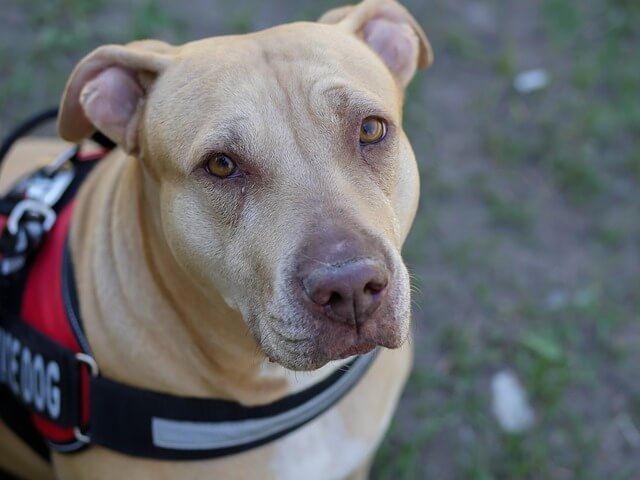
How to stop family dogs from biting
Dogs are all around us, and no matter what breed they are, they can bite. Dogs often bite to determine and explore an object they find interesting, and they bite the most when they play. Puppies will explore objects with biting, and during that time, they will learn what objects are toys and what objects should not be bitten. They will also learn that they need to be gentle and soft with their family members.
This is considered normal behavior, and mouthing (as it is called) often occurs in young dogs. However, this behavior can be considered irritating but not aggressive or dangerous. Serious bites can be prevented, and these are some of the most well-known techniques to achieve that goal and stop your dog from biting.
- Socialization
- Training
- Exposing your dog to strange objects they might be scared of
- Learn about your dog's behavior and signs leading to aggression
- Never use pain, fear, or aggression as punishment
- Use a muzzle
- Warn others if your dog is prone to bites
- Keep their vaccines up to date
If you know what to look for, you can easily anticipate when a dog might go for a bite. Many dog owners do not know how to understand their dog's body language correctly, and one of the most important things to know is - when your dog might be stressed and what are the signs of stress.
Signs of dog stress:
- Growling
- Barking
- Whining
- Freezing in place
- Pacing
- Panting
- "Whale eye"
- Tucked tail
- Tucked ears
- Lip licking
- Yawning
You should know how to quickly "defuse" the situation and react so that you avoid any unwanted situations. Give your dog clear commands and remove any object or whatever is causing your dog to be stressed. It would be best if you learned how your dog reacts to specific events and that you, as their owner, can quickly determine how your family dog will react and whether it will get stressed.
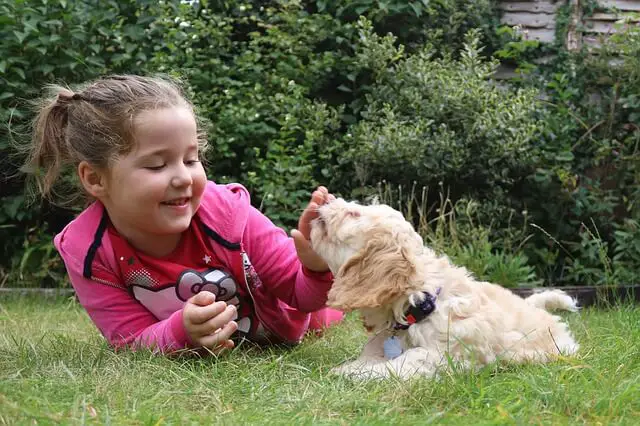
There are also rules you should know as a dog owner to interact with your family dog and other dogs safely. To keep your kids safe from dog bites, make sure you teach them these rules so that they can also thoroughly and SAFELY enjoy dog's company. If something bad happens with a dog, these rules will help you get away from the situation safely and hopefully spare you of any severe injuries or even save your life.
- Never touch a dog without the owner's permission
- Do not approach a dog that is eating or sleeping
- Never approach a dog caring for babies
- Allow the dog to approach you first, don't be pushy
- Do not try to place your head close to an unknown dog (kisses and hugs)
- Do not try to move an injured animal; contact authorities
- If a dog is cornering you, stand very still and avoid eye contact
- If you get attacked by a dog and knocked over, roll into a fetal position with knees close to your chest and arms covering your ears and neck
We sincerely hope you will never have to use these things, but these are good things to know if you are often visiting places with many dogs.
How to treat a dog bite?
If the worst happens and someone gets bitten by a dog, it is important to know how to treat the injury. If the injury is not that serious, you can take care of it at home with your first aid kit. If the injury seems deep, there is a lot of blood, you can't stop it from bleeding, or there are signs of infection, you should see a doctor as soon as possible. If you got bit by a dog that you do not know, you should see a doctor no matter how serious the injury is because you cannot be sure if that dog has been vaccinated and if their vaccines are up to date.
Here are a few steps you can do to treat a dog bite:
- Clean the wound with mild water
- Place gauze or a clean towel on the bite place to stop bleeding
- Keep the injured area elevated
- After the bleeding stops, clean again
- Apply the antibiotic ointment every day till the wound completely heals
- Keep all tight with sterile gauze and bondage
If you decide to see your doctor because the bite was extensive, prepare answers and information your doctor might ask you. Some of these questions might be - Was the dog vaccinated? Do you know the owner of the dog that bit you? Was the dog provoked or not? Do you have any medical problems your doctor should be aware of?
Having a family dog can be a beautiful thing, and 99,9% of family dogs end up being lovely companions for our kids. It is a great sign you are looking into the best dog breeds for kids, and we do not doubt that you will make an excellent decision for you and your family.
World Dog Finder team

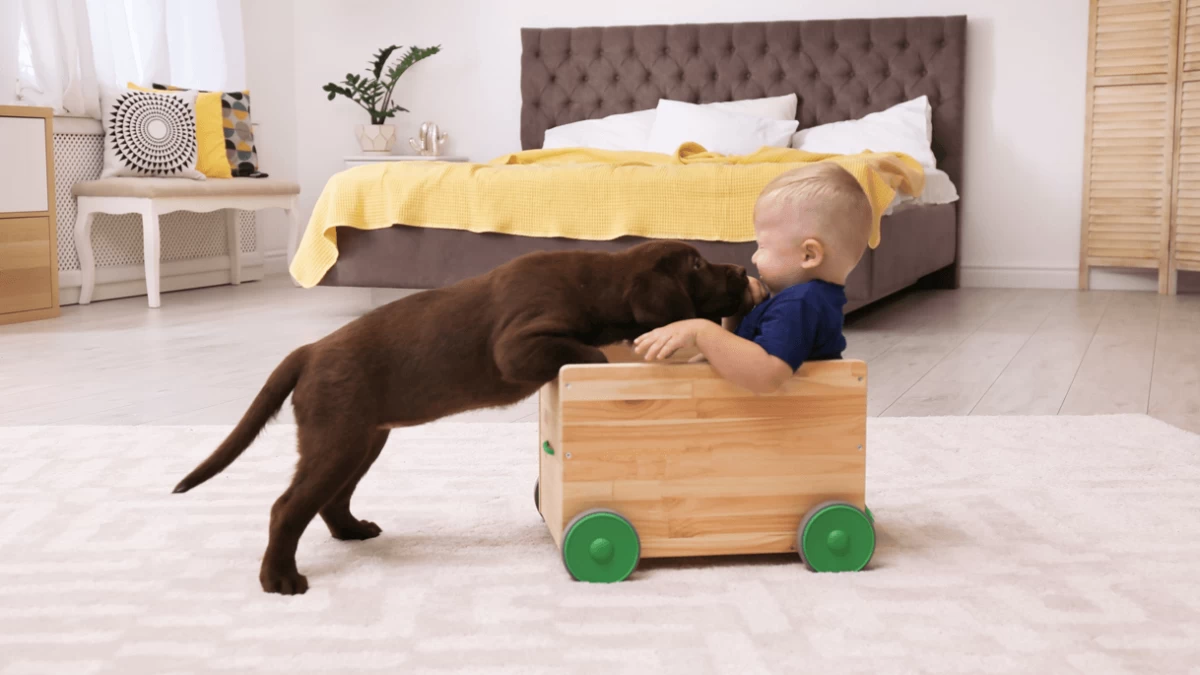





Share